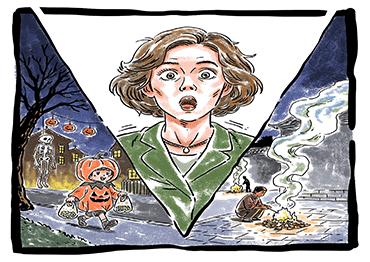alloween is my favorite holiday ever, since I was a little kid and discovered that there’s one day a year when I can get unlimited candy from strangers just by knocking on their door. I love Halloween so much that my costume planning each year begins at least two months before October even comes around. Yeah, at my house, Halloween is like the new Christmas.
So, to my surprise, one night when my husband casually mentioned before dinner “hey, don’t stay out too late. It’s Ghost Fest.” Huh? I always thought that China doesn’t celebrate Halloween, well, at least not to the extent that we do in the US, but to find out that China’s got its own ghost festival was like finding money in an old pair of pants that you haven’t worn in ages – unexpectedly awesome! Does this mean I’d get to celebrate TWO Halloweens each year? Score!
Before I got too carried away, I did a little digging, and it turns out, China’s Hungry Ghost Festival is not the same thing as Halloween – not by a long shot.
First of all, it’s not exactly one day. Each year, as the hot summer days come to an end, we enter what’s known as Ghost Month. Rooted in ancient Chinese folklore and Buddhism, it’s believed that as summer comes to an end, even though it’s harvest season, crops are beginning to die, making the gates between the living and the deceased the weakest time of the year and allowing spirits to enter our world.
The Ghost Festival, which falls on the 15th night of the seventh lunar month each year, right at the end of the summer, is believed to be the time when the gates between the two worlds swing wide open, allowing restless spirits and your ancestors to roam the world of the living.
If you’ve spent some time in China, this holiday will instantly remind you of the Qingming Festival, otherwise known as Tomb-Sweeping Day. And although the two are both about ghosts, they’re not exactly the same thing. Qingming Festival is about honoring your ancestors and your dearly departed. But Ghost Festival is for all of them – your ancestors, the lonely and forgotten, the agitated souls who passed on without any descendants to mourn them, those who died tragically with unfinished business, and so forth. They’re all bundled together under one term – hungry ghosts – beings who are unable to find peace.
So unlike Halloween, where kids go trick-or-treating all night, during the Ghost Festival, the local custom is to stay indoors at night. Not only do you not want to mingle and taunt the spirits, you’re supposed to do everything you can NOT to attract their attention because it’s believed that the spirits that you’ll attract are there to do you harm.
So as the sun sets on the eve of Hungry Ghost Fest, restaurants sit emptier than they normally would be and an eerie silence falls across the hotel lobby where we were staying. When the sun goes down, leave the outdoors to the spirits and stay inside. Locals say to bring in your laundry so that spirits don’t cling to it. Avoid drinking alcohol and snapping photos of the outdoors.
Sounds exactly like the opposite of the Halloween that we’re used to, huh? In fact, in places like Hainan Province in southern China, the locals observe this holiday to the point where even shopping is encouraged to be postponed to the following day, to avoid any lingering spirits being invited into your home along with your delivery.
While the taboos might suggest a month of pure dread and a 30-day horror movie marathon, the core of the Hungry Ghost Festival is ultimately compassion. It is a profound acknowledgment that not all departures are peaceful and that society has a responsibility to show care and respect to the lost and vulnerable souls, even in the afterlife. And whether done out of compassion, guilt or fear, it’s a time that makes us reflect on our day-to-day actions.
In a modern context, the festival remains a powerful reminder of the importance of filial piety, remembering one’s roots, and extending empathy beyond the visible world. It is a somber but beautiful tradition that honors the memories of the departed.

 Old Version
Old Version